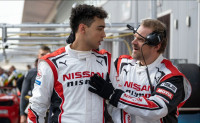MALAYSIA'S prodigal daughter, and the biggest international name to come out of this country, Michelle Yeoh, makes a glorious standout performance as lead in new movie Everything Everywhere All At Once. While she has remained active, with popular recent credits being Crazy Rich Asians, Shang Chi and Star Trek: Discovery series, these roles relegated her to supporting characters or cameo appearances.
In Daniel Kwan and Daniel Scheinert’s (collectively known as ‘Daniels’) movie, she takes centre stage, marking hopefully a triumphant rejuvenation of her career. She plays Evelyn, a laundromat owner who’s facing an audit from the Internal Revenue Service (IRS, basically the US equivalent of IRB/LHDN), while struggling to maintain a relationship with her husband and queer daughter.
We see the return of Ke Huy Quan into the mainstream, known for his endearing performance in The Goonies and Indiana Jones: Temple of Doom. He plays Waymond, who feels disconnected from his marriage with Evelyn and has filed a suit for divorce. Their only daughter, Joy pays them a visit with her girlfriend but finds it difficult to fit in. It’s Chinese New Year, and the movie opens with this immigrant family preparing for a dinner party and their IRS audit.
Genre filmmaking seems to be the modern lingua franca of the current cinema theatre-experience, and this movie is no exception. Daniels, following the success of their debut feature, Swiss Army Man, makes a full-tilt into science-fiction fantasy, and their love for the genre seeps through. Here, the movie falls into its own trap, and becomes a pastiche of the genre’s greatest exponents while completely missing the mark of saying anything even remotely challenging or original.
During their visit to the IRS building, Evelyn is confronted by Alpha Waymond (a variation of Waymond from the multiverse who taps into the present Waymond’s consciousness) and provides her with instructions on gaining access to the multiverse. The rules of the movie are set here: through the aid of a pair of 2010-era style earbuds, and a mix of quirky, highly improbable actions, she is able to slingshot into various iterations of Evelyn that exists throughout the multiverse and acquire their skills.
These scenes shine with Michelle Yeoh’s comic timing and cements her ability as a highly kinesthetic actor. The Daniels’ innovative use of practical effects, VFX technology and stop-motion animations offers a refreshing change of pace from the bombardment that audiences are used to from the Marvel franchise.
By gaining access to different versions of Evelyn throughout the multiverse, she also accesses possible variations of her life. At one point, she confronts Waymond of how beautiful her life could have been without him, and instead of allowing these deeply reflexive moments to breathe, the movie betrays itself and propels right back into its plotted-out action sequences.
A version of Evelyn that was featured prominently was her life as a martial arts movie star, clearly a stand-in for Michelle Yeoh’s career. Instead of offering a more careful deconstruction of her iconography, or the Evelyn that is an immigrant laundromat owner with the imagination of being a successful movie star, these other personalities are reduced to ‘avatars’ or ‘skins’ to defeat the machinations and followers of the movie’s villain, Jobu Topaki.
Jobu Topaki, we learn is the daughter of Alpha Waymond and Alpha Evelyn, who was pushed to the brink by experimentations and ends up acquiring the ability of being in all multiverse variations of Joy at once. Jobu Topaki, not unlike the Joy of the present universe, suffers the grief of isolation and loneliness for not being able to connect with anyone. She creates a bagel, a blackhole like object which sucks in everything from its vicinity and makes it her mission to find the Evelyn that could understand the pain she suffers.
Stephanie Hsu’s breakout performance as Joy and the chemistry she shares with Yeoh of their strained relationship makes the heart of the movie. The movie is a study of generational trauma, as Evelyn herself always falls short of her father’s expectations. James Hong, perhaps the most well-known Asian voice and actor in the history of Hollywood, plays Gong Gong.
James Hong brings a charming, incorrigible, and almost obstinate energy to his performance, despite the character being written so one-dimensionally. While Evelyn shares a moving reconciliation with her daughter at the end, the same cannot be said about her relationship with Gong Gong, which feels hamfisted.
Waymond also makes no presence on screen as Joy’s father, their relationship might as well be written off. Parental figures, especially the male elders cast a big shadow in Asian families. The lack of interiority within these characters makes their portrayal a bland, stereotypical presentation of Asian families, and offer little insight into the complexity of filial piety so inherent within Eastern culture.
An exegesis of the American brand of bureaucracy displayed in this movie could also be written as a majority of its runtime takes place in an IRS building, and Evelyn’s relationship with her IRS case agent (Jamie Lee Curtis) plays an important role in her emotional arc but that requires more space than this piece could offer.
Depending on your definition of the word, the concept of the multiverse in popular culture extends back a long time with shows like Star Trek or Quantum Leap, but has found a resurgence as a storytelling and narrative tool in recent years through the Marvel Cinematic Universe.
Despite the vast opportunity a concept like this presents, and if being “everything, everywhere, all at once” is akin to spiritual enlightenment, the characters in E.E.A.A.O spend no time contemplating these philosophical implications. Their epiphanies or realisations are reduced to generic aphorisms and platitudes.
The 'multiverse' here is ultimately used merely to drive the plot, adding little value to the experiences of these characters and all the clever visual gags it conjures up makes for a poor smokescreen for the thin material underneath. – The Vibes, April 16, 2022
* Kalash Nanda Kumar is a freelance writer






















